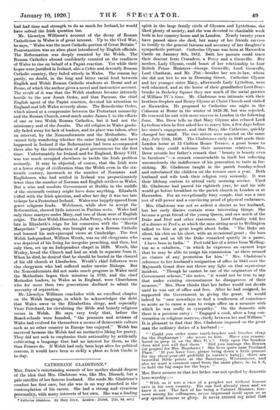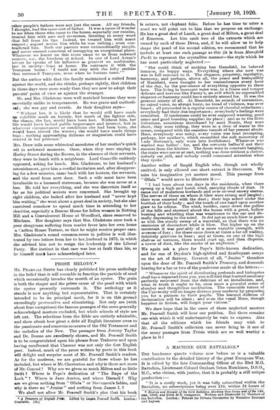CATHERINE GLADSTONE.*
Mits. DREW'S entertaining memoir of her mother should dispose of the idea that Mrs. Gladstone was, like Mrs. Disraeli, but a pale satellite of her famous husband. She made Mr. Gladstone's comfort her first care, but she Was in no way absorbed in the contemplation of his career. She had a strong and vivacious personality, with many interests of her own. She was a leading • Catherine Gladstone. By Mary Drew. London: Nisbet. (in (34. net.]
spirit in the large family circle of Glynnes and Lytteltons, she liked plenty of society, and she was devoted to charitable work both in her country home and in London. Nearly twenty years have passed since she died, but many of her friends survive to testify to the general fairness and accuracy of her daughter's sympathetic portrait. Catherine Glynne was born at Hawarden Castle on January 6th, 1812. Both her parents could trace their descent from Crusaders, a Percy and a Grenville. Her mother, Lady Glynne, could boast of her relationship to four British Prime Ministers—George Grenville, Lord Grenville, Lord Chatham, and Mr. Pitt—besides her son-in-law, whom she did not live to see in Downing Street. Catherine Glynne and her younger sister Mary, afterwards Lady Lyttelton, were well educated, and at the house of their grandfather Lord Bray- brooke in Berkeley Square they saw much of the social gaieties of William IV.'s time. Mr. Gladstone was intimate with their brothers Stephen and Henry Glynne at Christ Church and visited at Hawarden. He proposed to Catherine one night in the Coliseum at Rome in the winter of 1838-39, but was rejected. He renewed his suit with more success in London in the following June. Mrs. Drew tells us that Mary Glynne also refused Lord Lyttelton when he first asked her to marry him, a few days before her sister's engagement, and that Mary, like Catherine, quickly changed her mind The two sisters were married on the same day, July 25th, 1839. The Gladstones early in 1840 made their London home at 13 Carlton House Terrace, a great house to which they could welcome their numerous relatives. Mrs.
Drew records her father's remark that "beauty is beauty even in furniture "—a remark commendable in itself but reflecting unconsciously the indifference of his generation to taste in fur- nishing. Mr. Gladstone taught in the parish Sunday-school and entertained the children on the terrace once a year. Both husband and wife took their religion very seriously. It was their lifelong custom to attend early morning service. Until Mr. Gladstone had passed his eightieth year, he and his wife would go before breakfast to the pariah church in London or at Hawarden. For an exceptionally busy couple, that was a rare test of will-power and a convincing proof of physical endurance.
Mrs. Gladstone was not so ardent a diarist as her husband, but her early diaries contain some interesting things. She became a great friend of the young Queen, and saw much of the Duke and Peel and other statesmen. Lord Stanley told her of a dinner at Peel's, at which the man sitting next to Wellington talked to him at great length about India. The Duke sat silent, his chin on his chest, with an occasional grunt ; the bore went on and on till the Duke remarked quietly in a pause, 'I have been in India.'" Peel told her of a letter from Welling- ton as a subaltern, "in which he expresses an earnest hope that he may be able to resign his commission as there seemed no chance of any promotion for him.'" Mrs. Gladstone's reference to her husband's resignation of office in 1845 over the Maynooth Grant does not throw any light on that mysterious incident. "Though he cannot be one of the originators of the Government scheme,'" she notes, "it would not be true to say that under existing circumstances he disapproves of their measure." Mrs. Drew thinks that her father would not decide until he was out of office and free. After he had resigned, he supported the Government in giving the grant. It would indeed be "rare nowadays to find a tenderness of conscience
so acute as to cause a man to resign office on a measure with which he was really in sympathy." On the domestic side there is a precious entry : 'Engaged a cook, after a long con-
versation on religious matters, chiefly between her and William." It is pleasant to find that Mrs. Gladstone imposed on the great man the ordinary duties of a husband :—
"'Could you order some tooth-brushes and brushes cheap for the Orphanage?' she wrote to him. ' Have you remem- bered to peep in on the Miss D.'s ? Only open the boudoir door and you will find them.' 'Did you manage the flowers (or grapes) for Mrs. Bagshawe ? She lives quite near Portland Place.' 'If you have time, please bring down a little present for my three-year-old godchild [a curate's baby] : there are beautiful Bible prints at the Sanctuary, Westminster, and also we want a common easel from the same place, 5s. to 8/6, to hold the big maps for the boys.'"
Mrs. Drew assures us that her father was not spoiled by domestic hero-worship
With us it was a case of a prophet not without honour save in his own country. His sun had already risen and we knew it not. The fact of his being a Cabinet Minister, fore- most among his colleagues, never impressed itself upon us as any special honour or glory, It never crossed my mind that other people's fathers were not just the same. All my friends, I thought, had the same sort of father. It was a cause of wonder to me when those who came to the house,-especially our cousins, treated him with awe and reverence, listening to every word that fell from his lips. Indeed, we treated him with scant respeet ; argued across him while he was talking ; even con- tradicted him. Both our parents were extraordinarily simple, and never-seemed conscious of occupying an exceptional plane. Whatever we learnt on this score came to us from outward sources, e.g., the brothers at school. In one of Lord Acton's letters he speaks of his influence as greatest on multitudes, less in society—least at home. He contrasts it with -the Tennyson home : '1 could not stay with the lofty entities that surround Tennyson, even when he butters toast."
But the author adds that the family maintained a united front against the world, and she thinks, perhaps rightly, that children in those days were more ready than they are now to adopt their parents' point of view as against the stranger.
Mr. and Mrs. Gladstone were well matched because they were essentially unlike in temperament. He was grave and methods- cal; she was gay and erratic. As their daughter says-
" Without her, it is likely that he would still have made an indelible mark on history, but much of the lighter side, the charm, the fun, would have been lost. Without him, her life would have lacked public importance and interest, but in whatever circumstances or conditions she had been born, she would have stirred the waters ; she would have made things hum ; nothing approaching dullness or stagnation could have existed in her presence."
Mrs. Drew tells some whimsical anecdotes of her mother's quick wit in awkward moments. Once, when they were staying in Harley Street during the Recess, in the absence of their servants, they were to lunch with a neighbour. Lord Granville suddenly appeared, asking for lunch. Mrs. Gladstone, to her husband's astonishment, gave him a cordial invitation and, after disappear- ing for alervr minutes, came back with her hostess, the servants, and the meal from next door. Such a wife must have been
Invaluable to a harassed statesman, because she was never at a loss. He told her everything, and she was discretion itself so far as his political secrets were concerned. She brought up eight children, she looked after her husband and "never kept him waiting," she went about a great deal in society, but she also
contrived somehow to spend much time in attending to her charities, especially a Rescue Home for fallen women in Notting Hill and a Convalescent Home at Woodford, since removed to Mitcham. Her daughter says that Mrs. Gladstone once took a poor clergyman suffering from scarlet fever into her own home n Carlton House Terrace, BO that he might receive proper care. Mrs. Gladstone's sound common-sense in polities is well illus- trated by two letters from her to her.husband in 1875, in which she advised him not to resign the leadership of the Liberal Party. - Her instinct in that case was less at fault than his, as he himself rauet have acknowledged later.



































 Previous page
Previous page